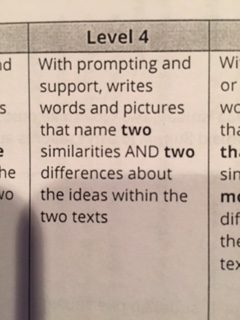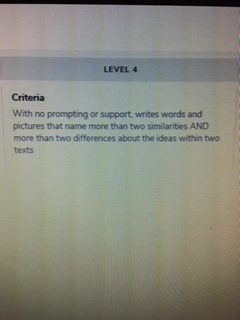Our story begins in the early weeks of Kindergarten with a student we’ll call Eric.
Eric is excited about starting school. He loves the new friends he’s making and he really likes his teacher.
Very early in the academic year, all the students are handed a small packet of worksheets as the teacher and a teaching assistant set up an iPad at a table in the room. The students are told to work quietly and that each of them will be called to the teacher to answer a few questions.
Eric’s name is called. His teacher explains what’s happening, that he’ll be asked a few questions and he’ll be recorded by the assistant. After the teacher establishes that Eric is comfortable with what’s about to happen, she poses a question. Eric’s mind searches, and he offers an answer. Now, he has to demonstrate his understanding. The assistant is aiming the iPad at him while attempting to watch the other 19 students in the classroom.
The interaction takes a little more than 5 minutes. The teacher and assistant make sure the event is recorded and labeled and set up for the next student. Eric returns to his desk and begins the worksheets.
Eric and his classmates (and all Kindergarten students in Tennessee) are participating in an evidence collection that is required as part of the Tennessee Educator Acceleration Model (TEAM) Pre-K/Kindergarten portfolio. This portfolio of student work will be used to determine the effectiveness of Eric’s teacher.
At the end of the school year, another Kindergarten teacher who has been trained in the evaluation process will review the portfolio submitted by Eric’s teacher and assign a score. This score will be combined with classroom observations and an achievement measure to determine whether or not Eric’s teacher was “effective.”
The portfolio was required for all Kindergarten teachers for the first time this school year. The idea is that since Kindergarten teachers have students who don’t take TNReady, there has to be some way to evaluate their effectiveness besides classroom observation. Previously, these teachers received a “growth score” based on the school’s overall growth as determined by testing results.
Teachers submit evidence of students performing at high, middle, and low levels on standards at the beginning of the year and then at the end of the year. This requires evidence collection at various points, the most cumbersome being at the beginning of the year, when the students are largely unknown to the teachers.
Kindergarten teachers I talked to estimate the evidence collection process takes up a minimum of five instructional days. This means students aren’t actively engaged in the learning process during the evidence collection days. As in the scenario with Eric, it requires the full attention of the teacher (and if possible, an assistant) in order to collect the evidence. This doesn’t include the tagging of evidence or the uploading to an often unreliable online platform known as Educopia. Some districts report hiring subs on evidence collection days so teachers can document the evidence from their students.
One might suspect the same Department of Education that can’t coordinate a statewide test administration would also have difficulty coordinating the evaluation of Kindergarten teachers via an online portfolio system. Such a suspicion is proving to be correct as we come to the end of the first year of this mandated system.
Here’s one example. At the beginning of this school year, teachers were provided with a rubric to indicate the demonstrated skills for various performance levels. Here’s what that rubric indicated was a level 4:

Now, the submitted evidence is graded by a Kindergarten teacher who has been “trained” and who receives a very small stipend to complete the evaluation. Here’s what the evaluation rubric indicates is a Level 4:

So, is it WITH or WITHOUT prompts? Maybe we should ask U2’s Bono?
Imagine teaching all year and basing your evidence collection and tagging on one rubric only to discover that you are being evaluated on a different, more difficult standard? Oh, and this is only one of the many standards included in the portfolio evaluation.
Moving on to the scoring process, each teacher self-scores the submitted portfolio. Then, another teacher evaluates. If the scores are more than two levels apart, an “expert” receives the portfolio to make a determination.
What do those experts have that the initial teacher evaluating did not? First, a willingness to assess even more portfolios. Second, “guidance” from the Tennessee Department of Education.
The initial portfolios were to be evaluated by May 15th. Then, the portfolios with score disputes go on to the “experts.”
Here’s the text of an email about that sent on May 15th:
Dear Educator,
Thank you for all your hard work! The portfolio scoring in the general pool concludes at 11:59pm tonight. The consensus review scoring begins tomorrow, Wednesday, May 16, 2018.
In the event that you were unable to meet your 10 portfolio review requirement (the same as 40 collections) AND you have demonstrated competence during the certification process and/or general pool scoring, you may receive additional portfolios to score. Reviewers who will receive additional portfolio submissions in this next phase and Expert Reviewers will be provided additional guidance to support the scoring process.
Thanks for all that you do! Please look for our next communication in 24 hours.
Here’s a follow-up email sent on May 16th:
Thanks again for your patience and support. We are still developing the guidance documents for the next phase of peer review. Our goal is to make sure you have the most comprehensive and best information to be successful. We appreciate your understanding and will communicate in the next 24-48 hours with updates.
So, no guidance YET for those scoring the second round. This despite the fact the portfolios were required for all teachers THIS year after being piloted by a few districts last year.
The Department of Education has had two full years to develop guidance for “consensus review scoring” and it is still not available. In fact, according to these two emails, the guidance is being developed right now. Was the Department of Education surprised that May 15th actually arrived this year?
How many parents are aware that their child is spending time in Kindergarten working as evidence collection specimens for a system used to assign a 1-5 number for their child’s teacher? How many know just how much instructional time is lost to this process?
Eric has now just about completed Kindergarten. He knows no other “normal” environment for school. Complete the task, be recorded, do it again at the end of the year.
The story doesn’t note the hours his teacher spent tagging evidence and uploading it instead of (or in addition to) preparing for learning activities for her class. The story also isn’t over. The results of the first year of statewide, mandatory Kindergarten portfolios have not been recorded.
Due to complaints at the start of this school year, legislators passed “hold harmless” legislation that will not allow this year’s portfolio results to negatively impact a teacher’s overall evaluation score. This may sound familiar, as “no adverse action” legislation was passed for those teachers impacted by TNReady scores.
Eric’s story is just one more example of a Department of Education that claims victory when the evidence suggests much improvement is needed. It’s a Department hellbent on pursuing supposedly lofty goals no matter the consequences to students or their teachers.
Lost instructional time due to portfolio evidence collection? No problem!
Days of stress and chaos because TNReady doesn’t work? Outstanding!
Teachers faced with confusing, invalid evaluations? Excellent!
Eric and his teachers and Tennessee’s schools and communities deserve better.
Do you have a portfolio story to share? Email me at andy@tnedreport.com
For more on education politics and policy in Tennessee, follow @TNEdReport
Keep the education news coming!



